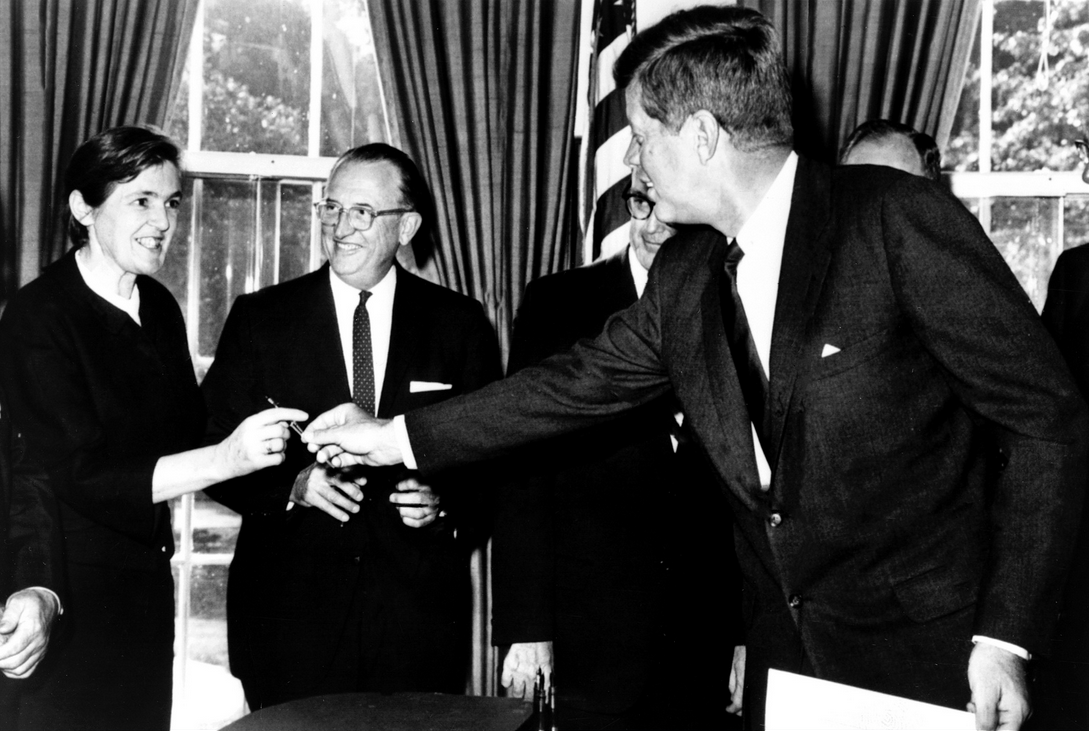When President John F. Kennedy pushed the U.S. Congress to put more regulations on drug approvals, he cited the work of a little known Canadian scientist born in British Columbia.

“We have to concern ourselves about the appreciation of Dr. Kelsey, who spared us this terrible human tragedy…and to provide administrative and legislative safeguards to less the chance of such action coming in this country,” he said at a televised press conference in 1962.
The “human tragedy” he referred to was the effects of thalidomide, a sleeping pill that was already widely used across Europe.
But it turned out the drug was causing severe birth defects in thousands of babies, most of which would kill the children at a young age.
And the drug would have been approved in the U.S. – if not for the work of Dr. Frances Oldham Kelsey, who turned 100 years old today.
Kelsey was born in the small village of Shawnigan Lake. After studying in Victoria and Montreal, she eventually made her way to Washington D.C., where she was hired by the Food and Drug Administration.
Her first assignment was to review an application for thalidomide.
“I got it because I was new and they thought it was an easy one to start on,” said Kelsey with a laugh years later.
Instead, she questioned why the pharmaceutical company didn’t provide more data. She insisted the drug be tested more.
Despite much pressure, she rejected approving thalidomide on six separate occasions. During this time, researchers in Germany and Australia proved a link between thalidomide and birth defects – including hands and feet coming out of shoulders and hips – that were dramatically increasing.
In 1962, the Kefauver Harris Amendment was passed, ensuring all manufactures must give the F.D.A. proof that their products are safe and effective.
Kelsey was pronounced a hero. “Heroine of FDA Keeps Bad Drug Off Market” wrote the Washington Post.
Kelsey told Global News in 2007 that she had no idea what her stubbornness would accomplish.
“I didn’t anticipate that sort of effect from it,” she said.
Kelsey was in Kennedy’s office when he approved the amendment, and was given the President’s Award for Distinguished Federal Civilian Service for her efforts.
She continued to work at the F.D.A. until she was 90, receiving several commemorations in the decades to come – including one back in her hometown.
In the 1990s, a new high school in the Cowichan Valley was needed. A contest was held, asking for submissions.
“Quite a number of people put forward her name,” said Nancy Bonner, Library Assistant at Frances Kelsey Secondary School.
“The board was happy to name the school in her honour…she’s certainly one of the most influential people to come from the area.”
All this may not have happened if her name was less masculine sounding.
“She was hired sight unseen by Dr. Eugene Geiling, a renowned pharmacology professor at the University of Chicago, because he read her name as Francis. When she got the acceptance letter, in 1936, she realized his mistake and asked a professor at McGill University whether she could accept the job,” the New York Times reported in 2010.
“When a woman took a job in those days, she was made to feel as if she was depriving a man of the ability to support his wife and child,” Kelsey said. “But my professor said: ‘Don’t be stupid. Accept the job, sign your name and put “Miss” in brackets afterward.’ ”
Today, Kelsey lives in Maryland, still in good health. Her family plans to have their traditional roast beef dinner to celebrate. And according to Bonner, who has kept in touch with the family, there will be chocolate cake as well.
“There may not be 100 candles though,” she added.
“Maybe just one for the roman numeral.”




Comments